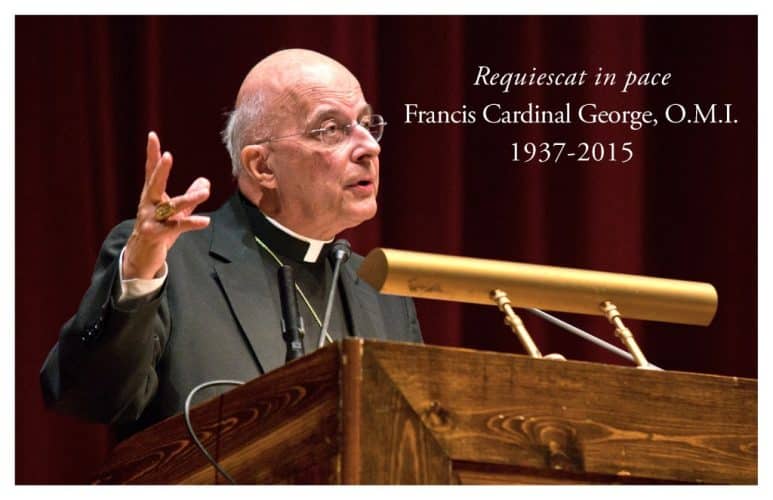 Saw the Importance of the Intellectual Apostolate for the Task of Evangelization
Saw the Importance of the Intellectual Apostolate for the Task of Evangelization
For the past seventeen years, Francis Cardinal George, O.M.I., Archbishop Emeritus of Chicago, devoted himself to guiding the nation’s third largest diocese (the Archdiocese of Chicago has 2.2 million Catholics)—inspiring immigrant Catholics to cling to Christ despite the difficulties of living in an unfamiliar country, and encouraging Catholics who have lived in the city for generations not to be led astray by secularism, materialism, and individualism—ideologies that undermine the spiritual integrity of American society.
In addition to all the duties that come with being an archbishop in a large metropolitan area, Cardinal George found time to engage in important philosophical debates with prominent intellectuals.
American journalist John L. Allen, Jr.—who specializes in coverage of the Vatican—has described George as the “American Ratzinger.” Although George dismisses this label, “insisting he’s not of Benedict’s intellectual caliber,” Allen contends that he is the “closest thing to it on these shores”—citing as his credentials his “blend of intellectual chops and tenacious commitment to Catholic tradition.”
The Lumen Christi Institute—where Cardinal George was Episcopal Moderator since its founding in 1997—provided him with a forum for wide-ranging philosophical discourse.
Cardinal George would often participate in Lumen Christi events—engaging eminent thinkers (i.e., American theologian David Tracy, Canadian philosopher Charles Taylor, French philosopher Jean-Luc Marion, and the late American ethicist and public intellectual Jean Bethke Elshtain) in the discussion of topics such as “The Catholic Faith and the Secular Academy” (1999); “What Can Philosophers Learn from the Tradition” (2005); “God, Freedom, and Public Life” (2011); and most recently “The Human Person, Economics, and Catholic Social Thought” (2014).
Kenneth L. Woodward—former religion editor of Newsweek—publicly praised Cardinal George in his letter “Farewell, Cardinal” in the Chicago Tribune for his being instrumental in the formation of Lumen Christi.
“One of Cardinal George’s most important legacies is his solicitude for the intellectual life of the church in Chicago,” wrote Woodward, “particularly as manifest in the support he has given to the Lumen Christi Institute, which he helped to create at the University of Chicago in 1997.”
Lumen Christi benefited immensely by having a Cardinal so deeply invested in its mission.
Lumen Christi Board Chair Noel Moore is grateful for so many years of the Cardinal’s leadership and guidance: “The relationship between the Cardinal and Lumen Christi was a natural and grace-filled match right from the Institute’s early days. Because of the Cardinal’s great scholarship and intellectual gifts, he was able to see our mission as a whole, and therefore wisely lead it.”
Jean-Luc Marion—who along with George was responsible for the creation of Lumen Christi—found the Cardinal a keen thinker who understood the distinct problems facing a society whose heart and mind was at conflict with its soul.
“Cardinal George was perfectly well aware that pastoral and intellectual concerns not only are compatible, but that, in an information-led and structured society, they flourish together,” says Marion. “Taking seriously philosophy—being himself a scholar in that field—he could see the depth and diagnose the weakness of the arguments, judging from the point of view of both transcendent and immanent truth of Christ.”
George had a combination of gifts that inspired his city of Chicago, but also resonated with the broader American Church—a Church often struggling with how to pass on the faith, how to speak of its relevance, within a modern secular context.
He called for a fundamental reevaluation of the conversation surrounding human rights, religious liberty, respect for life, just war, commerce, immigration, and globalization in his bookGod in Action: How Faith in God Can Address the Challenges of the World, which he published in 2011.
Don Briel—Founding Director of the Center for Catholic Studies at the University of St. Thomas and Lumen Christi Advisory Board Member—remarked of George’s influence: “As a religious, a priest, an intellectual, a pastor, and a teacher, Cardinal George was exceptionally well prepared to address the unique challenges and opportunities for the Church within modern American culture. He saw, as few others did, the central importance of the intellectual apostolate for the task of evangelization and he supported it in ways that will have a lasting impact not only in Chicago but also around the country.”
